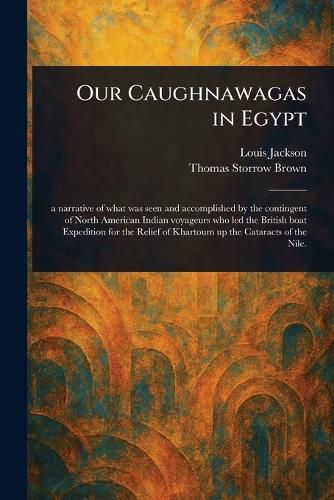Readings Newsletter
Become a Readings Member to make your shopping experience even easier.
Sign in or sign up for free!
You’re not far away from qualifying for FREE standard shipping within Australia
You’ve qualified for FREE standard shipping within Australia
The cart is loading…






This title is printed to order. This book may have been self-published. If so, we cannot guarantee the quality of the content. In the main most books will have gone through the editing process however some may not. We therefore suggest that you be aware of this before ordering this book. If in doubt check either the author or publisher’s details as we are unable to accept any returns unless they are faulty. Please contact us if you have any questions.
"Our Caughnawagas in Egypt" recounts a fascinating and largely untold chapter of British military history in the Sudan. Author Louis Jackson details the vital role played by a contingent of North American Indian voyageurs, specifically the Caughnawaga, during the ill-fated Nile Expedition to relieve the siege of Khartoum in 1884-1885. This historical narrative explores the unique skills and expertise these men brought to navigating the treacherous cataracts of the Nile. Witness their invaluable contribution to the British efforts as they led the boat expedition upriver. Delve into a rich account of adventure, resilience, and cultural exchange, shedding light on a pivotal moment in Sudan history and highlighting the participation of Native Americans in a faraway conflict. A compelling historical record, this book offers a unique perspective on a dramatic siege and the extraordinary individuals caught within its unfolding events.
This work has been selected by scholars as being culturally important, and is part of the knowledge base of civilization as we know it.
This work is in the public domain in the United States of America, and possibly other nations. Within the United States, you may freely copy and distribute this work, as no entity (individual or corporate) has a copyright on the body of the work.
Scholars believe, and we concur, that this work is important enough to be preserved, reproduced, and made generally available to the public. We appreciate your support of the preservation process, and thank you for being an important part of keeping this knowledge alive and relevant.
$9.00 standard shipping within Australia
FREE standard shipping within Australia for orders over $100.00
Express & International shipping calculated at checkout
This title is printed to order. This book may have been self-published. If so, we cannot guarantee the quality of the content. In the main most books will have gone through the editing process however some may not. We therefore suggest that you be aware of this before ordering this book. If in doubt check either the author or publisher’s details as we are unable to accept any returns unless they are faulty. Please contact us if you have any questions.
"Our Caughnawagas in Egypt" recounts a fascinating and largely untold chapter of British military history in the Sudan. Author Louis Jackson details the vital role played by a contingent of North American Indian voyageurs, specifically the Caughnawaga, during the ill-fated Nile Expedition to relieve the siege of Khartoum in 1884-1885. This historical narrative explores the unique skills and expertise these men brought to navigating the treacherous cataracts of the Nile. Witness their invaluable contribution to the British efforts as they led the boat expedition upriver. Delve into a rich account of adventure, resilience, and cultural exchange, shedding light on a pivotal moment in Sudan history and highlighting the participation of Native Americans in a faraway conflict. A compelling historical record, this book offers a unique perspective on a dramatic siege and the extraordinary individuals caught within its unfolding events.
This work has been selected by scholars as being culturally important, and is part of the knowledge base of civilization as we know it.
This work is in the public domain in the United States of America, and possibly other nations. Within the United States, you may freely copy and distribute this work, as no entity (individual or corporate) has a copyright on the body of the work.
Scholars believe, and we concur, that this work is important enough to be preserved, reproduced, and made generally available to the public. We appreciate your support of the preservation process, and thank you for being an important part of keeping this knowledge alive and relevant.